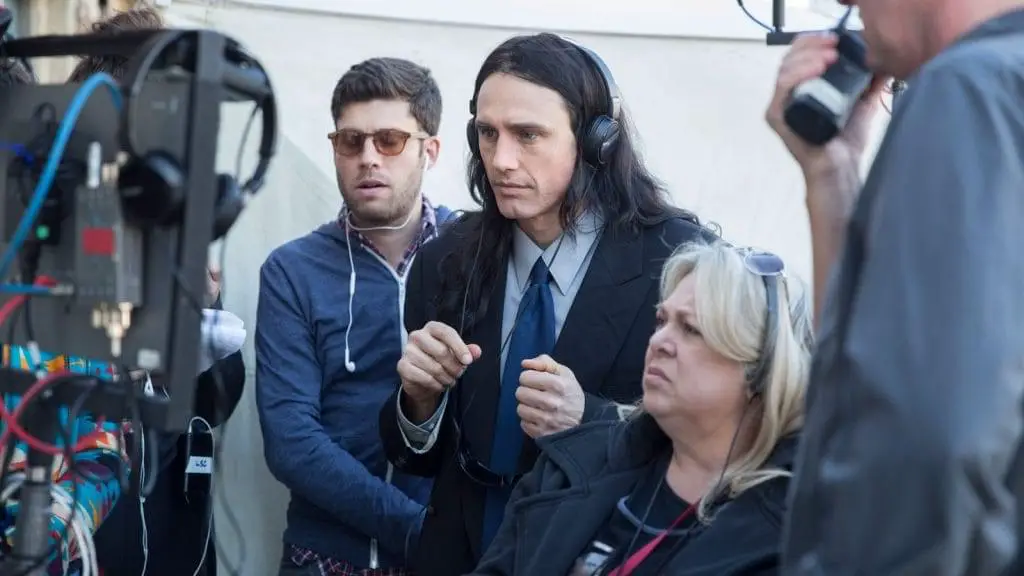
This review was originally published on March 18, 2014…
Harmontown is a documentary film that follows television writer and producer Dan Harmon as he takes his live podcast, also named Harmontown, on tour around the country. Recently fired from the show he created, Community, Harmon’s tour offers an opportunity to get away from that negativity and allow him to connect with his fanbase (or alternately learn if he even has one). As the tour goes from city to city, we learn more about Dan Harmon and his compatriots, podcast co-stars Jeff B. Davis, Spencer Crittenden and Harmon’s girlfriend, Erin McGathy. It is an eye-opening, soul-wrenching experience, in the best way possible.
I knew very little about Neil Berkeley’s documentary feature film when I sat down to watch it at the 2014 SXSW Film Festival, save the above basics I gleaned from the synopsis. I vaguely knew about Dan Harmon, mainly due to reading some gossip about the whole Chevy Chase spat regarding Community and Harmon’s subsequent firing, but I didn’t know about the podcast, and I haven’t actually seen an episode of Community (not out of spite or anything, and not meant as an insult; there are tons of popular TV shows I’ve never seen). I have seen Heat Vison and Jack, but never connected that specifically with Harmon (same thing with The Sarah Silverman Show). Basically, I came into the film pretty ignorant of all things Dan Harmon.
But now I think I know quite a bit, thanks to the emotional whirlwind that is Harmontown. It was a strange, extremely moving experience for me. There were moments of pure joy, where you couldn’t pry the smile off my face. Alternately, moments that angered me. I felt sad, happy, angry, depressed, amused; I think I might’ve almost teared up at one point. When the film ended and I walked out of the theater, I felt as emotionally exhausted as I’ve ever felt in my life. It was absolutely draining.
And I loved that. I loved that I was watching a documentary about a guy and his friends doing a live podcast tour across the United States, and I was getting ridiculously emotionally invested and engaged. Was I predisposed to this, based on who I am? The film certainly embraces the social misfits and the potentially damaged; its honesty revealing the human condition far beyond our accepted preconceptions of what it means to be successful, or good, or happy. In that way, I can relate (but seriously, who can’t?).
But the build up of this empathetic experience also means the film can be hard to watch sometimes. As you get ever more and more in Harmon’s corner, for example, it’s hard to watch him behave in a cruel way (which he is capable of doing; Sarah Silverman states that she’s his biggest fan, and even she fired him from her show for that self-destructive, outwardly abusive behavior). You don’t want to think that this guy, who you’ve now embraced, is capable of being such an unrelenting jerk. Likewise, when he’s addressing these moments himself, you want to reach through the screen and help him out with whatever personal realization he’s working toward. You also want to perhaps take that drink out of his hand, to see if that might make a difference; his drinking may not be the issue here, but it’s certainly tied up in whatever it is he’s wrestling with, or at least that’s how it seems.
Still, for all the focus on Harmon, the film’s standout winds up not being him at all. Instead, it’s Dungeon Master Spencer Crittenden who turns out to be the one who you can’t help but root for. While both Harmon and Crittenden are examples of the conflicted Everyman in their own ways, there is something of an awkward innocence that comes across from Crittenden that makes you instantly want to see him succeed. There’s also something to be said for seeing someone do something they’re obviously great at; I don’t play Dungeons and Dragons, but if I did, I’d want someone like Crittenden running the show (there’s a reason he’s a Dungeon Master and not just, you know, Dungeon Guy).
In the end, I don’t know if I walked away from this film specifically a fan of Dan Harmon, but I’m definitely an unapologetic fan of this film. And I think what I’m most connecting with here is the experience the film conveys, this creation of a cinematic safe place where we can all expose, and address, our strengths and flaws. We can cry if we need to, we can laugh and we can also express our anger. It’s not judgment (says the film critic) so much as allowing ourselves to feel all the complexities of what it means to be human, via empathy with those around us, or up on screen. And that can be exhausting, but also so very worth it.

PLUS, your older, hairier brother Stew Bell is in the background of this photo!
We don’t talk about Stew anymore…